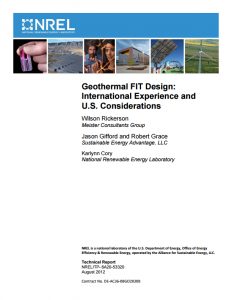Full Title: Geothermal FIT Design: International Experience and U.S. Considerations
Author(s): Wilson Rickerson, Jason Gifford, Robert Grace, and Karlynn Cory
Publisher(s): National Renewable Energy Laboratory (NREL)
Publication Date: August 1, 2012
Full Text: Download Resource
Description (excerpt):
Developing power plants is a risky endeavor, whether the plants utilize conventional or renewable generation technologies. Feed-in tariff (FIT) policies can be designed to address some risks specific to geothermal power plant development, although they have not been used in the United States to date.
By April 2012, there were 11,224 megawatts (MW) of geothermal electric capacity installed in 24 countries (Holm 2010; GEA 2012). The United States leads the world with 3,187 MW installed. Despite these statistics, the cumulative amount of geothermal electricity generating capacity installed in the United States has expanded slowly in recent years, increasing approximately 2.3% annually on average since 2008 (GEA 2012). During 2011 and the first quarter of 2012, the addition of two new geothermal plants and the expansion of three existing plants added 91 MW of new capacity.1 Geothermal market development faces a range of unique barriers related to the cost and uncertainty of resource exploration and confirmation drilling. In addition, geothermal projects face risks similar to other generation project development, including finding buyers for power, ensuring adequate transmission capacity, competing to supply electricity and/or renewable energy certificates (RECs), securing reliable revenue streams, navigating the legal issues related to project development, and reacting to changes in existing regulations or incentives.
